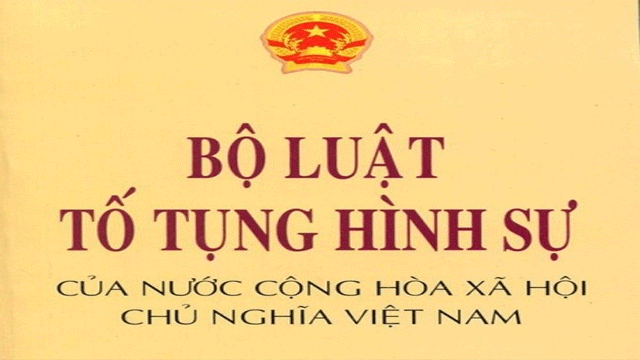This topic has been the subject of controversy for a long time as the concept of "resisting law enforcement officers" remains quite ambiguous.
Crime of Resisting Persons in the Performance of Their Official Duties
As stipulated in Article 257 of the 1999 Penal Code and Article 330 of the 2015 Penal Code:
Any person who uses force, threatens to use force, or uses other means to obstruct a person performing their official duties from carrying out those duties, or compels them to perform unlawful acts, shall be subject to a non-custodial reform of up to three years or a prison term of six months to three years.
Who Are Persons Performing Official Duties?
As stipulated in Clause 1 Article 3 of Decree 208/2013/ND-CP on preventive measures, deterrence, and handling of acts of resisting persons in the performance of official duties:
"Officials and public employees, officers, non-commissioned officers, soldiers of the People's Armed Forces who are assigned by competent authorities, organizations, or individuals to perform tasks, powers according to the provisions of law and protected by law to serve the interests of the State, the people, and society."
Thus, it can be broadly understood that "persons performing official duties" are those executing public affairs on behalf of the state, exercising state power. If a person performs "incorrect public duties," they cannot be considered as acting on behalf of state power, and obstructive acts might not be deemed crimes of resisting against official duty.
However, the execution of official duties encompasses various forms and content. There are cases where a person performing official duties might not know or cannot know whether they are performing a correct or incorrect official duty. For example, individuals executing a court's asset confiscation decision will certainly be guilty of resisting persons in the performance of official duties, regardless of whether the decision is correct or incorrect. Clearly, even if the decision is wrong, those performing official duties are only acting according to the decision. If they contradict or violate the decision, that is when it would be considered "incorrect public duty." The fault lies with the issuer of the decision, not the person executing it.
Consider another scenario: a traffic police team conducting traffic violation enforcement on Road X. The public duty here is to penalize traffic violations on Road X. If this police team, for some reason, wrongfully penalizes or enforces on Area Y while on their way to Area X, can it be considered "incorrect public duty?" The state grants the power to "penalize violations," not to "penalize non-violations," and when an official performs an "incorrect public duty," it is hard to state they are acting "on behalf of state power."
The 1871 German Penal Code, with resisting persons performing official duties stipulated in Article 113, clearly states the condition for application as lawful execution of duties (rechtmäßige Ausübung), meaning the crime cannot be automatically attributed if the official duties are performed unlawfully. This condition was maintained in Article 113 for 98 years, surviving four Penal Code revisions, including one in 1943 under the Nazi regime. It is a critical legal element protecting citizens against abuses of power. In 1970, to enhance protection from abusive power, the lawmakers of the Federal Republic of Germany replaced this with a more explicit provision:
"Acts (resisting persons performing official duties) cannot be penalized under this provision (i.e., provision in Article 113) if the execution of official duties is not lawful."
When official duties are properly performed, resisters should be punished. But when executed incorrectly, citizens should not have to accept it silently and cannot be easily convicted of resistance for self-defense actions.
.jpg)
What Constitutes Use of Force or Threatening Use of Force?
This is a crucial point in constituting the crime of resisting persons in the performance of official duties:
- Using force is understood as acts using physical strength that could harm the person performing official duties, causing health injuries or damage (not significant injuries, as assessed by medical examiners), aiming to obstruct them or compel them to perform unlawful acts, such as punching, kicking, using a stick to hit, throwing soil, and stones.
- Threatening to use force involves using words or actions to intimidate the person performing official duties, making them fear that force will be used immediately to hinder their duties or compel them to perform unlawful acts.
In practice, many cases arise where citizens merely obstruct (through words or non-violent actions) officials performing "incorrect public duties" and are threatened with charges of resisting persons in the performance of official duties. This has caused citizens fear, allowing "incorrect public duties" to continue.
Clause 2 Article 8 of the 2013 Constitution of the Socialist Republic of Vietnam stipulates, "State agencies, officials and public employees must respect the People, be dedicated to serving them, closely connect with them, listen to their opinions, and be subject to their supervision." Therefore, why fear when exercising rights, remembering that the Constitution’s legal value is higher than the Law.
Thus, understanding legal provisions can help avoid unfortunate accusations of resisting persons performing official duties and ensure appropriate legal behavior when encountering "incorrect public duties," upholding one's rights within the legal framework.
 Article table of contents
Article table of contents





.Medium.png)
.Medium.png)
.Medium.png)
.Medium.png)
